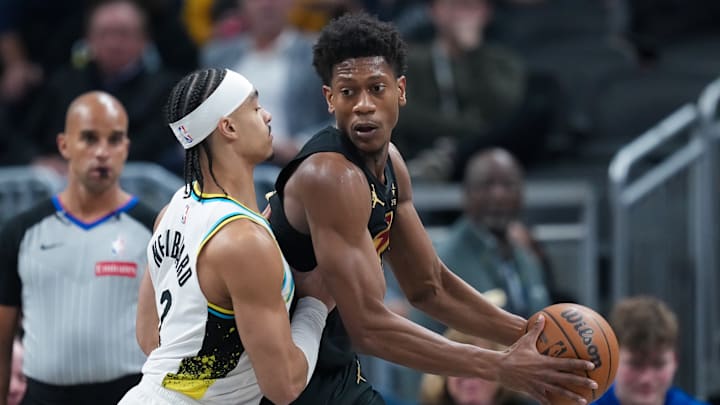The Cleveland Cavaliers had one primary goal entering this season - keep the stars healthy and prepared for the playoffs.
To accomplish this, head coach Kenny Atkinson limited each star player's minutes, relying on the second unit to offer the starters extra rest. His tactical offensive approach has maximized the value each player brings, building balanced lineups to elevate each player's potential. His insight into his roster not only constructed his case for Coach of the Year, but helped keep the stars healthy. No single Cavalier played more than 32 minutes per game, with Donovan Mitchell averaging 31.4 each night. Throughout the year, Atkinson employed a 12-man rotation as a dozen Cavaliers averaged at least 19 minutes per game.
Atkinson's confidence in his bench was justified, not only with Cleveland's conference-high 64-18 record, but because of the dynamic contributors in the second unit. Ty Jerome, the Cavs' backup point guard and bench leader, ranked in the 97th percentile in Points per Shot Attempt, per Cleaning the Glass. In the veteran guard's comeback season from injury, he averaged 12.5 points, achieving a 60.7 effective field goal percentage, ranking in the 90th percentile.
Jerome's elite offensive production forced defenses into tough positions, especially as the Cavs paired Jerome with one of their star guards Mitchell or Darius Garland in most lineups. His impactful and confident approach quickly put Jerome into Sixth Man of the Year discussion.
At the trade deadline, the Cavs added another top-tier bench contributor, trading Georges Niang and Caris LeVert in exchange for De'Andre Hunter from the Atlanta Hawks. Hunter, a 6'8" combo wing, gave the Cavaliers another reliable two-way forward, shooting over 40 percent from three and defending at a high level.
Other bench players, namely Sam Merrill, Isaac Okoro and Dean Wade, have given the Cavaliers a deep, versatile rotation. In the postseason, teams typically shrink the rotation, relying on stars and their top role players to carry the load.
With the postseason nigh, Atkinson has suggested he may subvert expectations, maintaining a 9-to-10 rotation.
The Cavaliers must continue to trust in the bench to make a Finals push
While unorthodox, Atkinson's approach could be the crux of the Cavaliers' playoff dominance. Last year, the Cavs fell apart with injuries as the starters were forced to play extended minutes to outlast the Orlando Magic in Round One. By the time Cleveland advanced to the Conference Semifinals against the Boston Celtics, Jarrett Allen was sidelined with a serious rib injury, and Mitchell was still battling a lingering injury from the late regular season.
Throughout the regular season, the Cavs' bench ranked eighth in points per game (39.7), with both Jerome and Hunter shooting over 40 percent from deep. Three of Cleveland's primary bench contributors finished the season with a net rating above 10, with Isaac Okoro leading at a 12.5 net rating. Wade and Merrill were within one, giving the Cavaliers plenty of reason to trust in their depth in the postseason.
With the best record in the conference, the Cavaliers will hold a significant advantage against their first-round opponent. Not only will homecourt advantage play in Cleveland's favor, but the Cavs will have enjoyed roughly a full week of rest while the eventual eighth seed will battle through the Play-In Tournament ahead of the matchup.
Beyond the numbers, each bench player fills a necessary role in the Cavs' rotation. Okoro, a defensive specialist, takes on the hardest assignments in every game he plays. When the Auburn product steps on the hardwood, he uses his physicality and seemingly endless stamina to lock down the rival star.
As for Wade, he provides a true 3-and-D forward, using his size to accomodate for the Cavaliers' undersized backcourt. Defensively, Wade is consistently one of the best wing stoppers in the league, and he can be a decisive contributor from the arc when he gets into a rhythm.
While Merrill is not as defense-oriented as his aforementioned teammates, the Utah native is liable to light up the court from range almost on command. Merrill's overall shooting took a dip this season, but Atkinson has been confident in deploying his sharpshooter to give the Cavs' offense a spark when they open the night sluggish. To his credit, Merrill has shown solid defensive effort this year, too, but he is still primarily an offensive spark plug.
As the postseason goes on, the Cavaliers may be forced to make cuts to the nightly rotation as the need for well-rounded, reliable players takes precedence over the specialists that occupy the end of the Cavs bench. Nonetheless, the longer that Cleveland can rely on depth to limit progressive fatigue, the more likely that the Cavaliers can enter the later rounds with health and energy on their side.
